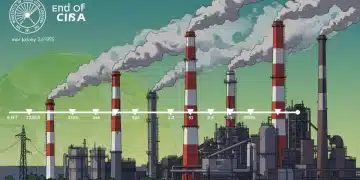Court energy policy discussion: understanding the impacts

Court energy policy discussions focus on how legal rulings shape regulations, affecting community access to energy, environmental compliance, and sustainable practices while influencing economic growth and public health outcomes.
Court energy policy discussion plays a vital role in determining how we manage our energy resources. Have you ever wondered how legal rulings affect your daily life and the environment? This article dives into the influences and implications of these discussions.
Understanding the basics of energy policy
Understanding the basics of energy policy is crucial for anyone interested in how our energy systems function and evolve. This area encompasses regulations, laws, and guidelines that dictate energy production, distribution, and consumption.
Energy policy affects us all, influencing everything from our utility bills to the environment. Let’s explore some essential elements that shape energy policy.
Key Principles of Energy Policy
At its core, energy policy focuses on various key principles that guide decisions:
- Sustainability: Ensuring energy systems are environmentally friendly and can be maintained over time.
- Affordability: Making energy accessible and affordable for consumers and businesses.
- Security: Protecting energy resources from disruption and ensuring a reliable supply.
- Efficiency: Promoting the use of technologies and practices that reduce energy consumption.
These principles interconnect and support one another in shaping a coherent energy strategy. When policymakers aim to balance these principles, they face various challenges and trade-offs.
For instance, while developing renewable energy sources supports sustainability, it must also consider the affordability and reliability of energy supply. As we navigate through these challenges, the role of courts in interpreting laws becomes vital, further shaping the landscape of energy policy.
Understanding energy policy and its basic concepts is essential for engaging in discussions about our energy future. It gives us the tools to analyze policy proposals and their implications for our lives and environment.
The role of courts in shaping energy regulations
The role of courts in shaping energy regulations is significant and multifaceted. Courts interpret laws and rulings that impact how energy policies are enforced and implemented. This influence can have lasting effects on energy production and use.
When disputes arise regarding energy regulations, the courts often become the final arbiter. They can decide whether a regulation is legal or if it contradicts existing laws. For example, court rulings may address challenges to environmental regulations, which directly influence how energy companies operate.
Key Areas of Court Influence
Several key areas highlight the influence of courts on energy regulations:
- Environmental Compliance: Courts ensure that energy companies comply with environmental laws, particularly regarding emissions and land use.
- Consumer Rights: The judiciary plays a role in protecting consumer interests, such as fair pricing and service reliability.
- Utility Regulations: Legal rulings can define how utilities operate and may affect rates and available services to consumers.
Throughout history, landmark cases have established precedents that shape current energy policy. Understanding these legal landmark cases helps us appreciate the delicate balance courts maintain between protecting public interests and facilitating energy development.
As we consider the future of energy regulation, we must acknowledge that the judicial system is instrumental in guiding policy evolution. Courts serve to check and balance administrative agencies, ensuring accountability in how energy is managed.
Key cases influencing energy policy debates

Key cases influencing energy policy debates play a crucial role in shaping regulations and standards within the energy sector. These landmark cases often set important precedents that guide future energy decisions and policies. Understanding these cases helps us see how legal rulings can impact our energy landscape.
One significant case is the Massachusetts v. Environmental Protection Agency, where the Supreme Court ruled that the EPA has the authority to regulate greenhouse gas emissions. This landmark decision opened the door for stricter regulations on emissions from power plants, influencing energy policy discussions nationwide.
Other Significant Cases
A few more cases stand out for their profound impact on energy policy:
- Utility Air Regulatory Group v. EPA: This case challenged the EPA’s authority to regulate emissions from stationary sources, affecting how states approached air quality standards.
- California v. Federal Energy Regulatory Commission: In this ruling, the court affirmed states’ rights to regulate energy markets, which reshaped how states interact with federal energy regulations.
- Kentucky Utilities Co. v. FERC: This case involved the Federal Energy Regulatory Commission’s role in approving power rates, showcasing the ongoing tension between state and federal authorities.
These cases illustrate how courts can significantly influence energy policies, often reflecting larger societal values and priorities. The outcomes of such cases raise questions about environmental responsibilities, economic burdens, and the future of renewable energy sources.
As discussions continue to evolve, these rulings serve as guideposts for lawmakers and regulatory agencies when drafting new policies. The interplay of legal interpretations and energy regulation is a dynamic area that demands attention.
Impacts of energy policy on communities
The impacts of energy policy on communities are profound and often multifaceted. Energy policies shape how energy is produced, distributed, and consumed, and these changes can significantly affect local environments and economies.
When energy policies favor sustainable practices, communities often see benefits like cleaner air and renewable energy jobs. For instance, policies promoting solar energy can lead to the development of solar farms, creating local employment opportunities while reducing carbon footprints.
Economic and Social Effects
Energy policies also have economic and social implications, including:
- Job Creation: Energy transitions can create new jobs in renewable sectors, offering opportunities for training and development.
- Health Outcomes: Cleaner energy sources can lead to better public health outcomes by reducing pollution.
- Energy Access: Policies that promote equitable access to energy can help lower-income communities gain reliable power sources.
However, there can also be negative impacts. For example, policies favoring fossil fuel extraction may lead to environmental degradation, affecting local water sources and air quality. Such adverse effects can result in community opposition and calls for stricter regulations.
Overall, the relationship between energy policy and community well-being is dynamic. Policymakers must navigate these impacts carefully, striving for solutions that ensure a balance between energy needs and community health.
Future trends in energy policy discussions
Future trends in energy policy discussions are essential to understanding how our energy systems will evolve. As the world faces pressing challenges like climate change and resource scarcity, new approaches to energy management are emerging.
One significant trend is the increasing focus on decarbonization. Governments and organizations are setting ambitious goals to reduce greenhouse gas emissions. This shift is driving discussions on transitioning from fossil fuels to renewable energy sources like wind, solar, and hydroelectric power.
Emerging Themes in Energy Policy
Several key themes are shaping future energy policy discussions:
- Energy Equity: There is a growing recognition of the need for fair access to energy for all communities, ensuring that marginalized groups benefit from clean energy initiatives.
- Technological Innovation: Advancements in energy storage and grid management are paving the way for smarter energy systems.
- International Collaboration: Countries are increasingly engaging in partnerships to address global energy challenges, sharing best practices and technologies.
Moreover, the role of consumers is changing. People are more aware of their energy choices and are demanding sustainable options. This has led to a rise in decentralized energy systems, where individuals and communities generate their own energy through solar panels or wind turbines.
As energy policy continues to evolve, the integration of social, economic, and environmental factors will be crucial. Addressing these interconnections can lead to more comprehensive and effective policies that benefit everyone.
FAQ – Frequently Asked Questions about Energy Policy Discussions
What is the primary focus of future energy policy discussions?
The primary focus includes sustainability, equity, and technological innovation in energy systems.
How do energy policies impact communities?
Energy policies can create jobs, improve health outcomes, and ensure equitable access to energy for all communities.
What role do courts play in shaping energy regulations?
Courts interpret laws and rulings, ensuring energy regulations are applied fairly and legally.
Why is consumer engagement important in energy policy?
Consumer engagement helps shape policies based on public needs, leading to more equitable and sustainable energy solutions.





